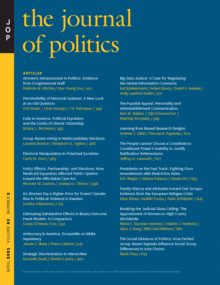
Stephen B. Kaplan PhD
George Washington University
Welcome to my website!
I am an associate professor of political science and international affairs in the Department of Political Science at George Washington University, and the Institute for International Economic Policy (IIEP) at the Elliott School of International Affairs.
My research and teaching interests are on the frontiers of international and comparative political economy, where I specialize in the political economy of global finance and development, the politics of macroeconomic policy-making, Chinese foreign economic policy, and Latin American politics.




Available Now!
What happens when developing countries borrow from China instead of Western markets and multi-laterals? Given the considerable scale of China's global financing, what are its costs and benefits relative to more traditional financing sources? To what extent can other rising or middle income powers replicate China's state-led capitalism? What are its implications for debt and dependency?

What happens when developing countries borrow from China instead of Western markets and multilaterals? Given the considerable scale of China's global financing, what are its costs and benefits relative to more traditional financing? To what extent can other middle income powers replicate China's state-led capitalism? What are its implications for debt and dependency?
Available Now!
Find it at Cambridge University Press.
Reviewed in the January 2023 issue of Journal of East Asian Studies.
Review in the November/December 2022 issue of Foreign Affairs.
Reviewed in the December 2022 issue of Latin American Research Review.
Reviewed in the June 2022 issue of Perspectives on Politics.
Bloomberg News featured the book in a Q&A column with Tom Hancock.

Journal of East Asian Studies. 1-3: 2023.

Foreign Affairs: Nov./Dec.: 2022.

Media
Appearances
Commentary
China and Russia are Venezuela’s two main bilateral creditors, accounting for one-quarter of the nation’s foreign debt. To what extent do these nations share geopolitical ends in the Western Hemisphere? Or might their financial ties reflect divergent foreign economic policy approaches?

China and Russia have deep financial ties to Venezuela. Here’s what’s at stake.
The Washington Post
Research
Articles
The Political Economy of Sovereign Debt: Global Finance & Electoral Cycles
The Journal of Politics
Political economy theory expects politicians to use budget deficits to engineer an election-timed boom, known as the political business cycle. We challenge and contextualize this view by incorporating global financial constraints faced by national governments into an electoral framework.

Policy-Relevant
Articles
The Story of the Creditor Trap: How China Reduced its Venezuelan Risk.
Foreign Affairs LatinoAmérica
With Michael Penfold
How has China’s foreign policy towards Venezuela changed in the last few years? Is this about debt-trap diplomacy, or a more nuanced credit-trap dilemma?
For more details, see here




